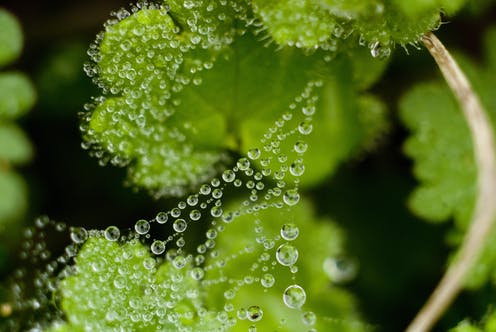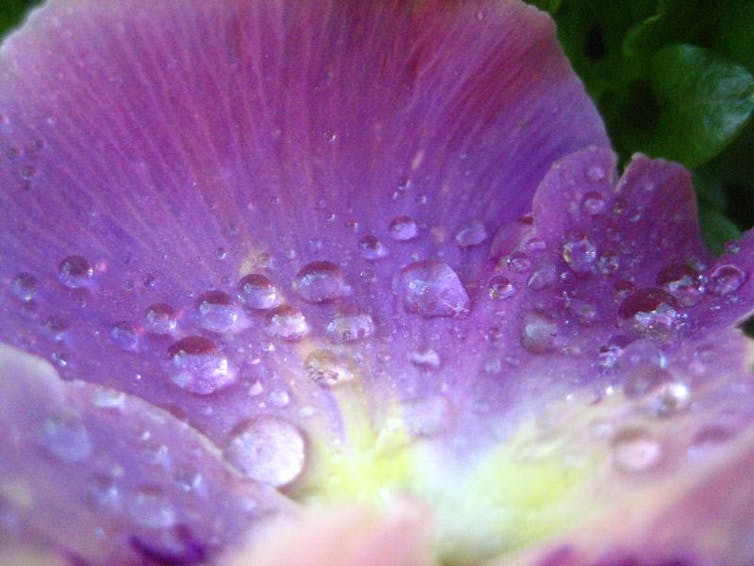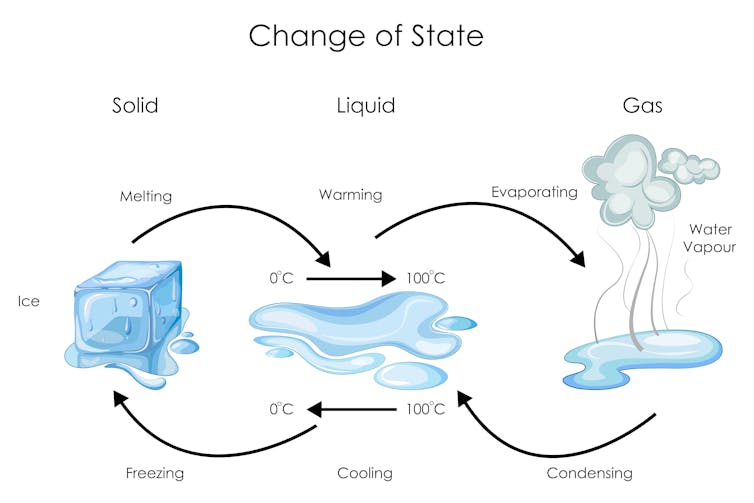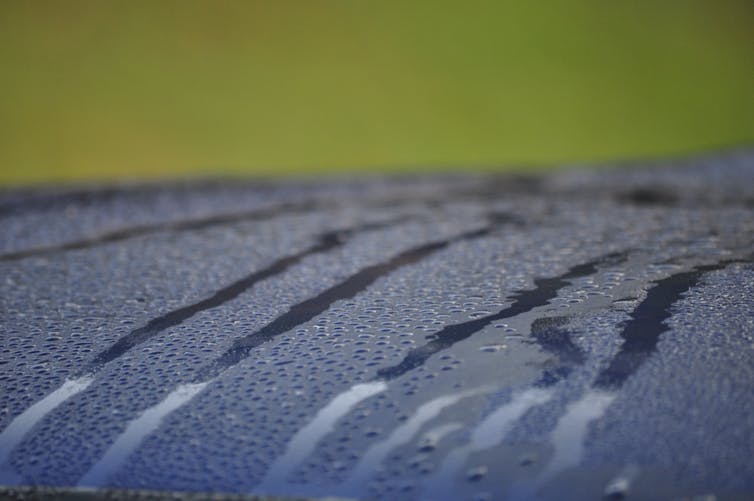Curious Kids is a series for children in which we ask experts to answer questions from kids. You might also like the podcast Imagine This, a co-production between ABC KIDS listen and The Conversation, based on Curious Kids.
I am wondering: is dew the same as rain? What is dew? Thank you – Leo, age 3.
Great questions, Leo!
I am a plant ecologist, and rain and dew are things I need to understand. Plant ecology is all about learning how plants are affected by the world around them (their environment) in the same way that you are affected by your environment.
For example, if you go outside you might consider putting a hat on so you don’t get burnt by the hot sun. Or you might put a coat on so you don’t get cold or wet. Plants are greatly affected by water, whether it comes from dew or rain. So are rain and dew the same?
Read more: Curious Kids: How do you know that we aren't in virtual reality right now?
Dew can form on flowers, too. Flickr/Sarah, CC BY
Dew is the water droplets that we find in the morning on leaves and other things outside, and usually in spring or winter when the air is cold. It is similar to rain because it forms from condensing water vapour. I hear you asking, “…but what does condensing water vapour mean?”. I will try to explain.
Water can be a liquid (we drink liquid water), it can also be a solid (think of ice cubes), and it can be a gas, which we call water vapour. When water warms up enough it breaks into small, fast-moving parts, called molecules. It changes from being a liquid to a gas – water vapour – that floats about in the air.
Water can be solid (like ice), liquid (like the water we drink) or vapour (a gas, like steam). Shutterstock
Think about how the steam (which is water vapour) from your hot bath floats about your bathroom.
So, now you understand what water vapour is and how it is made, think about what will happen if the fast moving water vapour cools down: this will help you understand condensation.
As the vapour cools, it slows down. The small parts, the molecules, start to gather together, especially on cold things (like a cool leaf) or in cold areas (like high in the sky). Scientists would say the water condenses.
If enough water molecules gather together (like a little water molecule “meeting”) they form a droplet of liquid water.
This same process (condensation) occurs when the stream from your hot bath condenses on the cold bathroom mirror – have you ever drawn a face on it?
When steam from your bath cools down it can form droplets on your bathroom mirror - you can draw on it! Flickr/suzienewshoes, CC BY
Whether the droplets that form are dew or rain depends on where they formed.
Rain forms from water vapour condensing high in the sky as clouds. If enough water molecules gather together, it will get too heavy to stay in the sky and fall down on your head as rain.
Dew forms from water vapour that condenses on cold surfaces on the ground, like grass or a car on a cool morning (it usually gets a bit cooler early in the morning).
Here is some dew that formed on a car. M Fletcher, CC BY
All plants need water and so do we – it is very precious to all life! Most plants get their water from the soil, but this water originally fell as rain and then soaked into the soil.
Some plants and lichen (lichen are like plants) can absorb water from dew. It’s a little bit like they are “drinking” the dew.
I hope this helps.
Hello, curious kids! Have you got a question you’d like an expert to answer? Ask an adult to send your question to [email protected]

Please tell us your name, age, and which city you live in. We won’t be able to answer every question but we will do our best.



 Debate over H-1B visas shines spotlight on US tech worker shortages
Debate over H-1B visas shines spotlight on US tech worker shortages  Office design isn’t keeping up with post-COVID work styles - here’s what workers really want
Office design isn’t keeping up with post-COVID work styles - here’s what workers really want  Locked up then locked out: how NZ’s bank rules make life for ex-prisoners even harder
Locked up then locked out: how NZ’s bank rules make life for ex-prisoners even harder  The Beauty Beneath the Expressway: A Journey from Self to Service
The Beauty Beneath the Expressway: A Journey from Self to Service  The pandemic is still disrupting young people’s careers
The pandemic is still disrupting young people’s careers  Britain has almost 1 million young people not in work or education – here’s what evidence shows can change that
Britain has almost 1 million young people not in work or education – here’s what evidence shows can change that  What’s the difference between baking powder and baking soda? It’s subtle, but significant
What’s the difference between baking powder and baking soda? It’s subtle, but significant  Disaster or digital spectacle? The dangers of using floods to create social media content
Disaster or digital spectacle? The dangers of using floods to create social media content  Why have so few atrocities ever been recognised as genocide?
Why have so few atrocities ever been recognised as genocide?  Canada’s local food system faces major roadblocks without urgent policy changes
Canada’s local food system faces major roadblocks without urgent policy changes  Yes, government influences wages – but not just in the way you might think
Yes, government influences wages – but not just in the way you might think  Every generation thinks they had it the toughest, but for Gen Z, they’re probably right
Every generation thinks they had it the toughest, but for Gen Z, they’re probably right  Glastonbury is as popular than ever, but complaints about the lineup reveal its generational challenge
Glastonbury is as popular than ever, but complaints about the lineup reveal its generational challenge  Parents abused by their children often suffer in silence – specialist therapy is helping them find a voice
Parents abused by their children often suffer in silence – specialist therapy is helping them find a voice  The American mass exodus to Canada amid Trump 2.0 has yet to materialize
The American mass exodus to Canada amid Trump 2.0 has yet to materialize 


































